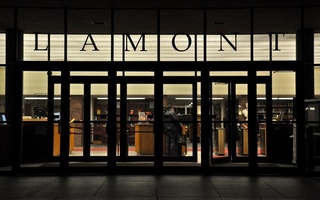THC: Do you have any recommendations for the students who are putting on “Antigonick” here at Harvard?
AC: no screaming
THC: Do you frequently encounter the question, "Why are the classics important?” and what is your response?
AC: usually in the form "how can we the Classics relevant to people today" and my thought is, how can we make ourselves relevant to them
THC: Do you find that the loss of classical knowledge in the general public affects how you write?
AC: yes, i need to explain more. explanation however is a deep and democratic thing, i can a lot from explaining things that seemed obvious
THC: To return briefly to “Antigonick”: in your version of the play, you depart fairly radically from Sophocles' text; however, in your translation of Sappho, your approach is very literal, even reflecting the spacing of individual words on the papyri fragments in your translation. Why the difference in treatment?
AC: i am never sure what anyone means by "literal"
but in fact the treatment of Sappho (spacing etc) is not any kind of replica of the original but a conceptual gesture toward the fact of fragmentation and the changing power of time
a translation is a folding of the original, a fold within a fold or unfolding to the following fold
i don't think Antigonick "departs" from the original so much as unfolds it in a way it hadn't been before
Hegel and Beckett are part of the original in the way that the inside of a fold is just the inside of the outside of the fold
Read more in Arts
Massey Lecture Profiles Bob Dylan's Murder Ballad


















